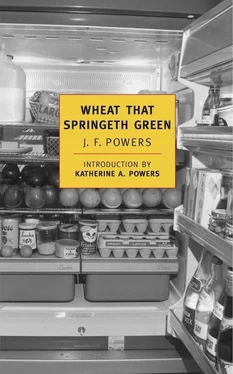J. Powers - Wheat That Springeth Green
Здесь есть возможность читать онлайн «J. Powers - Wheat That Springeth Green» весь текст электронной книги совершенно бесплатно (целиком полную версию без сокращений). В некоторых случаях можно слушать аудио, скачать через торрент в формате fb2 и присутствует краткое содержание. Год выпуска: 2000, Издательство: NYRB Classics, Жанр: Современная проза, на английском языке. Описание произведения, (предисловие) а так же отзывы посетителей доступны на портале библиотеки ЛибКат.
- Название:Wheat That Springeth Green
- Автор:
- Издательство:NYRB Classics
- Жанр:
- Год:2000
- ISBN:нет данных
- Рейтинг книги:5 / 5. Голосов: 1
-
Избранное:Добавить в избранное
- Отзывы:
-
Ваша оценка:
- 100
- 1
- 2
- 3
- 4
- 5
Wheat That Springeth Green: краткое содержание, описание и аннотация
Предлагаем к чтению аннотацию, описание, краткое содержание или предисловие (зависит от того, что написал сам автор книги «Wheat That Springeth Green»). Если вы не нашли необходимую информацию о книге — напишите в комментариях, мы постараемся отыскать её.
Wheat That Springeth Green — читать онлайн бесплатно полную книгу (весь текст) целиком
Ниже представлен текст книги, разбитый по страницам. Система сохранения места последней прочитанной страницы, позволяет с удобством читать онлайн бесплатно книгу «Wheat That Springeth Green», без необходимости каждый раз заново искать на чём Вы остановились. Поставьте закладку, и сможете в любой момент перейти на страницу, на которой закончили чтение.
Интервал:
Закладка:
Joe, embarrassed, whispered, “Sister, I know .”
Sister Agatha whispered, “Then you should’ve corrected Father — it should’ve been done right away — it wouldn’t have been impolite. Remember that in future.”
“Yes, Sister,” Joe whispered.
Sister Margaret whispered to herself, “Oh, what people must think !”
Father Stock called out, “You, boy!”
“Yes, Father.”
“Run and tell Father Day I said to give you the saucers and spoons.”
“Yes, Father.”
“And tell him I said not to hurry back.”
“Yes, Father.”
“Run, boy.”
“Yes, Father.”
“ Go! ”
“Yes, Father.” And before Father Stock could delay him again (not to speak when spoken to was impolite), Joe went , ran.
He met Father Day coming out of the rectory with the saucers and spoons wrapped in a napkin, and told him what Father Stock had said.
“Said that, did he? Not to come back?”
“Not to hurry back, Father.”
“He’s the buss,” Father Day whispered to himself, his monkey face looking different, old er , and giving Joe the saucers and spoons, turned toward the rectory.
“Father, you’re not coming back?”
“I am not.”
“But you’ll miss the race, Father.”
“I’ll be watchin’ from me window above. God speed yez, Jack.”
“Yes, Father.”
Joe ran back to the stand, holding the saucers and spoons so they wouldn’t rattle. Father Stock unwrapped them, stuck the napkin in his hip pocket, motioned Sister Agatha and Sister Margaret up to the stand, and said to one of the women behind the counter, “Double dips for the Sisters. No charge.”
Joe moved away from the stand, away from an old smelly man who looked like a tramp and said to the woman who’d handed him a cone, “No charge.” A joke?
“Pay Father,” the woman said.
The old man licked the cone.
“ Father ,” the woman said.
Father Stock said, “Five cents, mister.”
The old man licked the cone. “Try and git it.”
Joe was astonished to see Father Stock lie across the counter and, like a swimmer doing the breaststroke, swat the cone to the ground, the ice cream, only one dip, coming out of the cone and settling in the grass.
“No way to do,” the old man said, squatting down — Joe saw he wasn’t wearing socks — and was trying to scoop up the ice cream with the cone, but couldn’t, and was going to use his fingers when Father Stock helped him to his feet and pointed him toward the rectory. The old man still had the cone and was chewing on it with his gums.
“I’m turning this bird in,” Father Stock said to the women behind the counter, and to Joe, “Make change while I’m gone, boy.”
So Joe, warned by the women to watch out for Canadian coins (“Somebody tried to give Father one!”—“The very idea!”) and shown the cashbox, made change while the women filled orders and discussed the saucers on the counter (Sister Agatha and Sister Margaret had disappeared), one woman for putting the ice cream back in the freezer, the other one for letting it stay right there, where Father could see it when he returned. There wasn’t so much business. One woman could’ve handled it, and the other one, though she’d have to wash her hands if she went back to filling orders when Father Stock returned, could’ve made change. Joe wanted to say this to the women, but was afraid it wouldn’t do any good, and so said nothing. Then, when he couldn’t wait any longer — he’d been watching the crowd gathering over by the church — he blurted out, “I have to go now.” “Oh, dear!”—“Can’t you wait ?” Knowing what that meant — he couldn’t leave now — and too embarrassed to say anything, he turned away from the women so they couldn’t see his face. He wanted to cry, but didn’t, just snuffled. “Oh, dear!”—“Did you go ?” He was even more embarrassed, staring down at the cashbox. “Did somebody give you one ?”—“A dime or a quarter ?” He shook his head, not embarrassed, just annoyed. “Did somebody say something?”—“Oh, you poor kid!” He realized then that they knew who he was and had seen the picture in the paper.
“Here, what’s this?” said Father Stock, returning and seeing the ice cream melting in the saucers on the counter, but wouldn’t listen to the women, said “Shhh!” to them, for Sister Agatha was also returning to the stand. “Sister,” Father Stock said to her, “you and Sister didn’t eat your ice cream. Where’s Sister?”
“Over in church ,” said Sister Agatha. “ Praying . For you , Father. Oh, how you treated that poor old soul!”
“Now, now, Sister. Gave him a good talking-to and let him go. Gave him a dollar.”
Joe was astonished to hear this and thought Sister Agatha would be, but if she was she didn’t show it.
“And that’s not all , Father. You made Joe, here, miss the race with your — your moneychanging .”
“Sister, that was not my intention — and that’s what counts, fortunately for all of us here below. Come with me, boy. Make change while I’m gone, Sister, and eat your ice cream. Eat Sister’s too.”
Joe followed Father Stock through the crowd, over to where, alongside the church, the race had been run, where Sister Martina was assembling the contestants for the next event, and where Joe gave up the idea that Father Stock, who could do it, would order the race rerun.
“Sister, this boy, through no fault of his, missed the foot race. Please see that he gets one of those sacks.”
“I’m sorry, Father, but they’re all taken. Unless”—Sister Martina raised her voice—“someone would be willing to give up his or hers?”
A girl who wasn’t in hers yet, a sixth-grader who wore tortoiseshell glasses, said, “ I would, Sister.”
“Good for you, Dolores,” said Sister Martina (who taught the sixth grade).
Father Stock smiled at the girl, at Joe, said (to Sister Martina), “I have to get back to my stand,” and left.
Joe went over to the girl and whispered to her, thinking she’d be pleased to hear it: “It’s all right. I don’t want your sack. I’m not in this race.”
“Siste rrr !”
Sister Martina came. “ Now what?”
Joe got in first. “Sister, it’s all right. I don’t want her sack. I’m not in this race.”
“Sister, he has to be!”
“I don’t !”
“Father said !”
Joe reeled back. “Father didn’t !”
“No,” said Sister Martina, “but Father expects it.”
Joe could’ve cried, but didn’t. “Sister, I don’t want to.”
“Sister, he has to!”
“Nobody has to, but one of you should .” Sister Martina moved away from them, calling to the other contestants to line up.
“You know you’re the one ,” the girl said to Joe, stuck her tongue out at him, threw down the sack, and walked on it. “Thanks for taking my place. Half-Pint .”
“ Four Eyes. ”
Joe knew, when he picked up the sack, why the girl hadn’t got into it — it was dusty, which he didn’t mind so much, but damp at the bottom, which he did, and said BIG BOY POTATOES on it.
Joe went over to the starting line, carrying his sack to save energy, which other contestants were wasting by hopping around and falling down in theirs, but he also wanted to put off the moment when it would clearly be seen that he was one of them. When the moment came, he was laughed at by guys who knew he was the fastest runner in the fifth grade (and probably in the whole school), and by some of the girls, including one who’d been in love with him last year, and by Frances and her friends. Frances held up the Kewpie doll and said to it (really to her friends), “See Daddy!” Joe just smiled at Frances and everybody, so they couldn’t tell how he really felt about being in the sack race, so he wouldn’t get mad and cry and fight and maybe lose if he fought the guy he wanted to fight — Delbert Freeman, who was stumbling around, making believe his orange pop was whiskey, looking cross-eyed, and saying, “Hic!”
Читать дальшеИнтервал:
Закладка:
Похожие книги на «Wheat That Springeth Green»
Представляем Вашему вниманию похожие книги на «Wheat That Springeth Green» списком для выбора. Мы отобрали схожую по названию и смыслу литературу в надежде предоставить читателям больше вариантов отыскать новые, интересные, ещё непрочитанные произведения.
Обсуждение, отзывы о книге «Wheat That Springeth Green» и просто собственные мнения читателей. Оставьте ваши комментарии, напишите, что Вы думаете о произведении, его смысле или главных героях. Укажите что конкретно понравилось, а что нет, и почему Вы так считаете.












